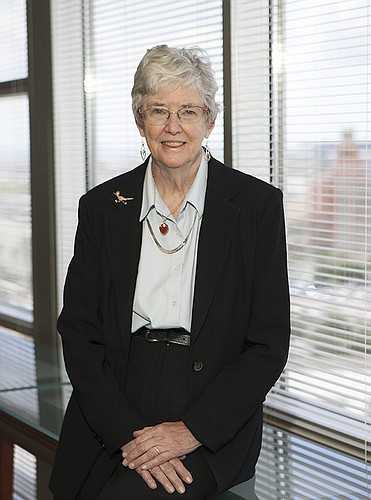- December 20, 2024
-
-
Loading

Loading

Decades ago, Carlton Fields attorney Sylvia Walbolt would get to the Tampa office at 5:30 a.m., to get her work done early so she could spend the evenings with her children.
She grew to love working in the quiet time, without the distractions around the office — so much so she kept it up.
Today, the 75-year-old shareholder and co-chair of the firm's National Appellate Practice and Trial Support group continues to show up at work before sunrise. The difference is today people know to show up early if they want to catch her.
Walbolt's legendary career was groundbreaking from the beginning, when, 52 years ago, the Tampa firm that always hired the “No. 1 man in the class” graduating from the University of Florida Levin College of Law, Carlton Fields, faced an interesting dilemma.
The No. 1 that year was Walbolt — a woman. She also happened to be the only woman in the entire law school class. At the time, women weren't hired to law firms. The firm called a board meeting to discuss what to do; senior attorneys didn't know how clients or judges would react to a woman on the team.
The small firm brought her in for a weekend of interviews. She was even challenged to a game of tennis with the firm's partners. One partner, the late Reese Smith, always said Walbolt's choice to partner with him to win the match 6-love, 6-love was the reason she was hired.
Walbolt came on board in 1963 as the firm's 12th lawyer. Today Carlton Fields has more than 400 attorneys and government and financial consultants in offices spanning California, Connecticut, Florida, Georgia, New York and Washington, D.C.
As an appellate lawyer for Carlton Fields, Walbolt has been involved in some of the firm's most notable cases. The list ranges from the appeal of the laws that banned same-sex marriage in Florida to helping lift multiple death row convictions.
In September, the American Bar Association's Death Penalty Representation Project will award Walbolt the 2016 John Paul Stevens Guiding Hand of Counsel Award, for her pro bono work assisting those facing death sentences. The award, in its fifth year, is one of the pinnacles of the profession, and American Bar Association officials who chose Walbolt for the award, according to a statement, were “simply blown away” by her accomplishments. Among her many letters of recommendation, there was one from prominent Harvard Law School Professor Laurence Tribe, who calls Walbolt a “legal angel.”
Lessons learned
Here are three key business lessons Walbolt has learned over her career:
Pro bono work is important and rewarding: In 2014, Carlton Fields represented six same-sex couples in Florida, free of charge. It was a frightening courtroom experience in Dade County, Walbolt recalls, with the room full of people saying hurtful things to her clients about not being fit to be parents. When the judge ruled in favor of the couples, Walbolt says there was such vindication. “That's why we went to law school — to represent people and help them get their rights,” Walbolt says. “I don't think there is anything more satisfying than that.”
Get out of your comfort zone: Pro bono work allowed Walbolt to practice and learn different areas of law and work with different groups of people. Getting involved in this kind of work gives a different perspective on life, Walbolt says. For example, she'll never forget visiting death row and seeing how the people convicted with death sentences live.
Find mentors: Walbolt became passionate about pro bono work by feeding off the fervor demonstrated by her two mentors. She looked up to Carlton Fields' Reese Smith, who founded Florida Legal Services and was well known as “Mr. Pro Bono.” She also learned from Thomas Clark, who worked for the firm and was an advocate for the rights of the mentally handicapped.